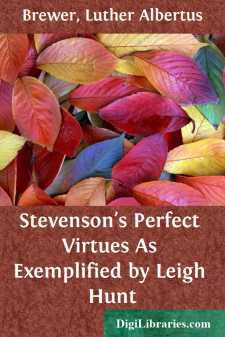Categories
- Antiques & Collectibles 13
- Architecture 36
- Art 48
- Bibles 22
- Biography & Autobiography 813
- Body, Mind & Spirit 142
- Business & Economics 28
- Children's Books 17
- Children's Fiction 14
- Computers 4
- Cooking 94
- Crafts & Hobbies 4
- Drama 346
- Education 46
- Family & Relationships 57
- Fiction 11829
- Games 19
- Gardening 17
- Health & Fitness 34
- History 1377
- House & Home 1
- Humor 147
- Juvenile Fiction 1873
- Juvenile Nonfiction 202
- Language Arts & Disciplines 88
- Law 16
- Literary Collections 686
- Literary Criticism 179
- Mathematics 13
- Medical 41
- Music 40
- Nature 179
- Non-Classifiable 1768
- Performing Arts 7
- Periodicals 1453
- Philosophy 64
- Photography 2
- Poetry 896
- Political Science 203
- Psychology 42
- Reference 154
- Religion 513
- Science 126
- Self-Help 84
- Social Science 81
- Sports & Recreation 34
- Study Aids 3
- Technology & Engineering 59
- Transportation 23
- Travel 463
- True Crime 29
Stevenson's Perfect Virtues As Exemplified by Leigh Hunt
Description:
Excerpt
Stevenson was right. There is not a more admirable trait in one’s character than that of cheerfulness. Combined with that other virtue named by Stevenson, gentleness, and what more is needed to make a companionable and a beloved man.
These two attributes were possessed in an emphatic way both by Stevenson and by Leigh Hunt. That’s why some of us are so fond of Hunt. That’s why he is growing in esteem as he is becoming better known to lovers and students of the literature produced in England during the first half of the nineteenth century.
For it is certain that Hunt is coming into his own. First editions of his writings year by year are advancing in price. They are becoming scarce and in some instances exceedingly difficult to obtain. Catalogues of rare book dealers are listing fewer of his works, and when quotations are made they invariably are in advance of those of a year or two ago.
The cultivation of cheerfulness frequently is enjoined throughout his writings. He had many visitors in his home, attracted there by his personal qualities and by his gentleness of heart. He was fond of music, which formed a staple in the entertainment and the conversation.
Barry Cornwall (B. W. Procter), a long time intimate friend, in his Recollections of Men of Letters, mentions the evenings at Hunt’s house: “Hunt never gave dinners, but his suppers of cold meat and salad were cheerful and pleasant; sometimes the cheerfulness (after a ‘wassail bowl’) soared into noisy merriment. I remember one Christmas or New Year’s evening, when we sat there till two or three o’clock in the morning, and when the jokes and stories and imitations so overcame me that I was nearly falling off my chair with laughter. This was mainly owing to the comic imitations of Coulson, who was usually so grave a man. We used to refer to him as an encyclopedia, so perpetually, indeed, that Hunt always spoke of him as ‘The Admirable Coulson!’ This vis comica left him for the most part in later life, when he became a distinguished lawyer.”
It was this same Barry Cornwall who introduced Hawthorne to Hunt, a charming account of Hawthorne’s visit being recorded in Our Old Home. “I rejoiced to hear him say,” he writes, “that he was favored with most confident and cheering anticipations in respect to a future life; and there were abundant proofs, throughout our interview, of an unrepining spirit, resignation, quiet relinquishment of the worldly benefits that were denied him, thankful enjoyment of whatever he had to enjoy, and piety, and hope shining onward into the dusk—all of which gave a reverential cast to the feeling with which we parted from him. I wish he could have had one draught of prosperity before he died.”
There are many of us ready to give expression to the same wish.
Speaking of Hunt’s Autobiography, a book second only in interest to Boswell’s Johnson said Carlyle, this caustic writer had the grace to say that the reader might find in that book “the image of a gifted, gentle, patient, and valiant human soul, as it buffets its way through the billows of time, and will not drown though often in danger; cannot be drowned, but conquers and leaves a track of radiance behind it.”
The Spectator, London, said this autobiography was one of the most graceful and genial chronicles of the incidents of a human life in the English language....


